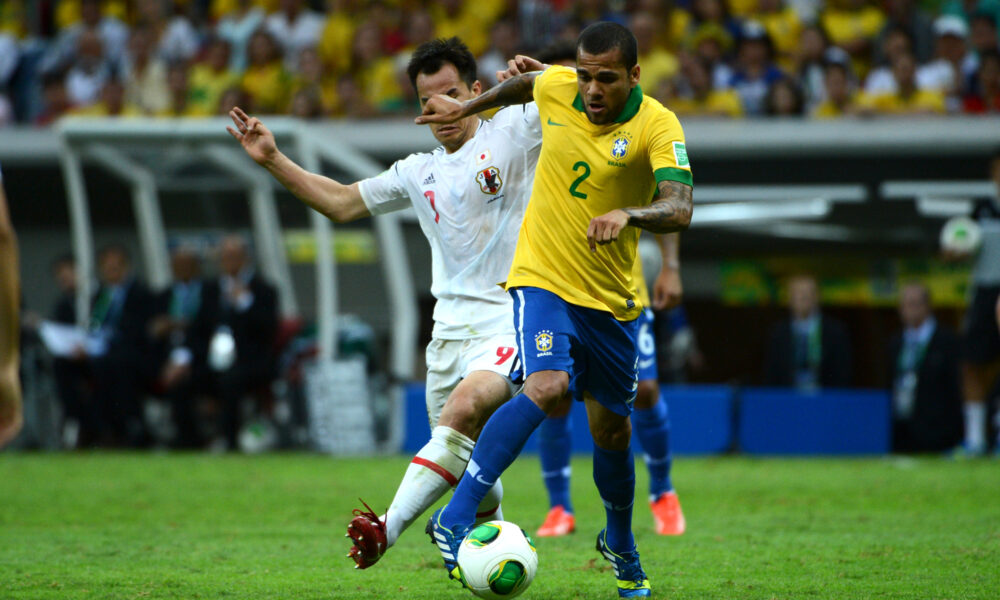On Feb. 22, the former Brazil, Juventus, and Barcelona footballer Dani Alves was sentenced to four years and six months in prison for sexually assaulting a 23-year-old woman in a Barcelona nightclub. This is a welcome step forward for Spain in the aftermath of the “la manada” assault case that kickstarted sweeping changes to Spanish law. In 2022, this culminated in the passage of “only yes is yes” sexual assault legislation which eliminates the burden of proof of the use of force for sexual assault convictions and centres around whether express consent is given by victims. While Alves’s conviction is remarkable on its own given the history of sports institutions ignoring assaults perpetrated by famous athletes, the implications of this case goes beyond the Barcelona courtroom.
Several high-profile cases have involved players going to trial, such as Benjamin Mendy, formerly of Manchester City, and Mason Greenwood, on loan at Getafe from Manchester United. Alves, one of the most decorated footballers of all time, is one of the rare cases where a footballer accused of sexual assault has actually been convicted. Indeed, there is an active Premier League player who has been accused of sexual assault by five women since April 2021 and has been arrested twice, but continues to play week in and week out for his club. Another Premier League player for Everton was also arrested in 2021 due to suspected child sex offences, only to have the charges dropped 21 months later. However, Everton did suspend the player indefinitely and did not renew his contract upon the revelation of the accusations.
Sexual assault is a widespread issue in the professional football environment. Yet messages of support for victims from players, coaches, and other powerful figures around the game are completely absent. On the contrary, coaches will testify at the accused’s trial in efforts to protect their current or former players. But why? As Sara Shepard writing for the Athletic points out, for players, this is personal. In an age where their every action is televised and made available to an audience of millions, players fear the trial-by-social media, which they perceive as threatening their careers and prospects. Male footballers fear they will be “unjustly” punished for their behaviour with women, or worse, falsely accused, by overzealous individuals seeking to make money off their reputation. While Mendy was not convicted of sexual assault, his trial revealed that he holds deeply misogynistic attitudes toward women. But when Mendy was found not guilty, many high-profile players leapt to his defence, lamenting the loss of his reputation and the damage done to his career. In hyper-masculine competitive environments, brotherhood is key to success. This is not an excuse to remain silent when teammates commit sexual assault.
When Greenwood, an incredibly talented academy prospect, had all charges dropped against him due to the withdrawal of key witnesses, many Manchester United fans wanted him to return to help bolster their faltering attack. Manchester United was going to bring him back until Adam Crafton of The Athletic broke the story early and the backlash was so severe that they pivoted and sent him to mid-table obscurity in La Liga with Getafe. Rumours that the initial delay in the decision was because United was waiting to consult the women’s team players who were at the Women’s World Cup last summer led to harassment of players online. Many members of the women’s squad privately expressed discomfort with Greenwood’s potential return.
These cases illustrate the barriers in place for the true inclusion of women in football. Afterall, how can women’s football grow when their male counterparts are repeatedly excused for some of the most vile acts a person can commit against another person?
Professional football must change. The misogyny endemic to football must be stamped out if we want the game to grow and be truly inclusive of all, especially women. For male footballers, we must begin capacity-building programs regarding consent and sexual assault when they are young, and create accountability structures which root out abusers at both the playing and coaching levels as fast as possible. Clubs must suspend players under investigation of sexual assault and domestic violence. Abusers do not deserve to sully the football pitches we so love. In the absence of judicial reforms, football must be transformed from within.









